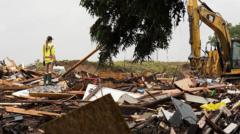The June 23 airstrikes on Evin prison in Tehran have drawn severe backlash, marking a pivotal point in the ongoing tensions between Iran and Israel. The prison, long recognized as a manifestation of oppression, recently experienced significant destruction as a result of the attack. Reports indicate that the strikes, which resulted in at least 79 deaths, including victims who were not incarcerated, have sparked outrage not only among the incarcerated and their families but also within various segments of Iranian society, including those who typically oppose the regime.
Israel Strikes Evin Prison: A New Rallying Cry Emerges

Israel Strikes Evin Prison: A New Rallying Cry Emerges
The recent airstrikes on Evin prison have transformed its image from a symbol of oppression to a focal point for dissent against Israel, igniting ire among even some government critics in Iran.
For decades, Evin prison has been synonymous with the Iranian government’s repressive tactics, hosting political dissidents and activists who have faced torture and severe punishment. Following the attack, the space has now become an unexpected rallying point, uniting voices across the spectrum of Iran’s political discourse, reflecting heightened resentment towards external aggression.
The airstrikes, deemed the deadliest in recent conflicts, have caused considerable destruction within the facility's grounds, including its administrative sectors and health facilities. Victims reported have included family members visiting inmates, healthcare professionals, and even young children.
As discussions about the implications of these airstrikes continue to unfold, they have catalyzed a movement against Israel in Iran - no longer simply seen as a military aggressor but transforming the landscape of dissent within the country itself, possibly reshaping future discourse on sovereignty and resistance.
The tensions between Iran and Israel remain volatile, as the consequences of such military actions continue to resonate within both nations and their respective allies.
The airstrikes, deemed the deadliest in recent conflicts, have caused considerable destruction within the facility's grounds, including its administrative sectors and health facilities. Victims reported have included family members visiting inmates, healthcare professionals, and even young children.
As discussions about the implications of these airstrikes continue to unfold, they have catalyzed a movement against Israel in Iran - no longer simply seen as a military aggressor but transforming the landscape of dissent within the country itself, possibly reshaping future discourse on sovereignty and resistance.
The tensions between Iran and Israel remain volatile, as the consequences of such military actions continue to resonate within both nations and their respective allies.




















